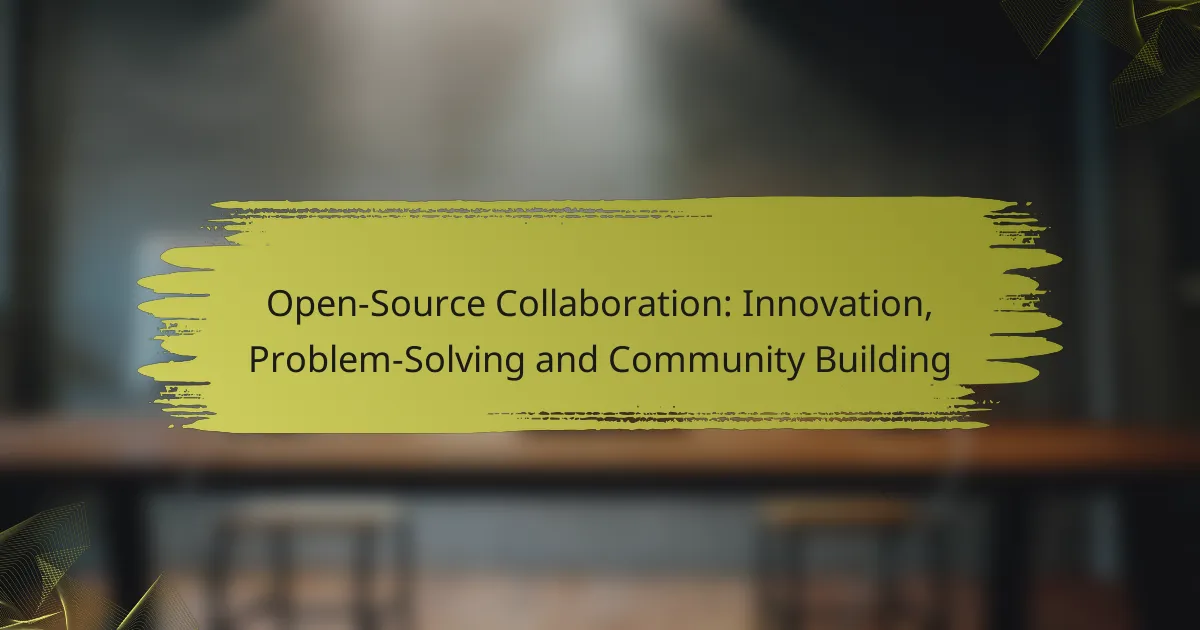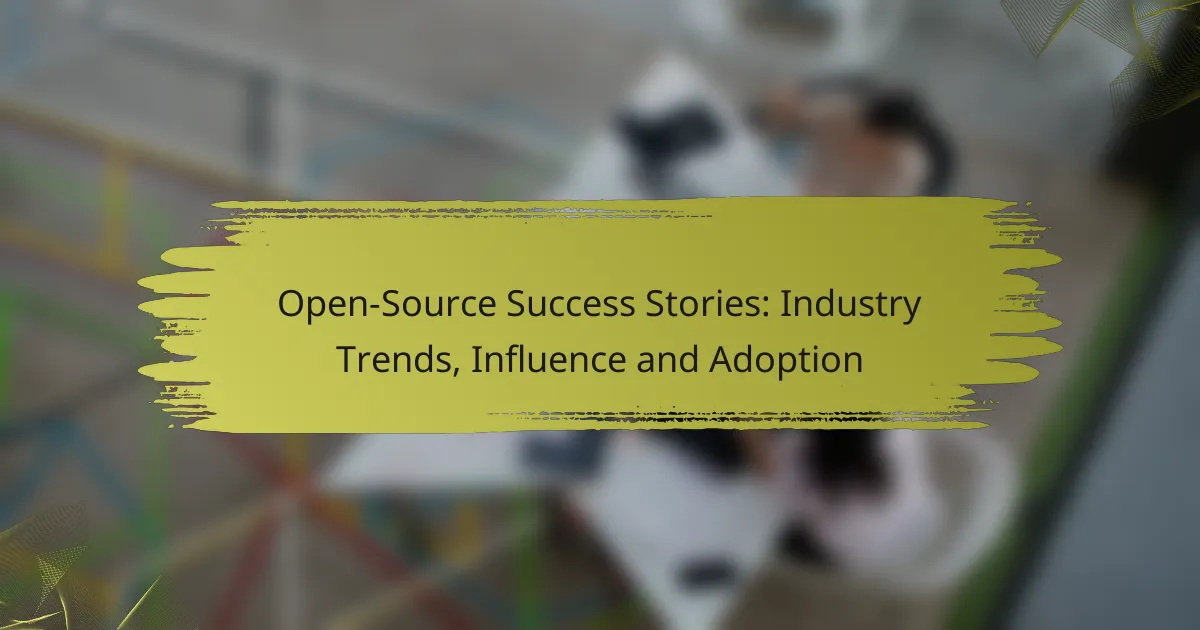Open-source collaboration is a powerful catalyst for innovation, bringing together diverse contributors to share ideas and resources, which accelerates problem-solving and fosters creative solutions. By leveraging platforms like GitHub and GitLab, communities can engage in dynamic project management and version control, enhancing the collective expertise available for tackling complex challenges.
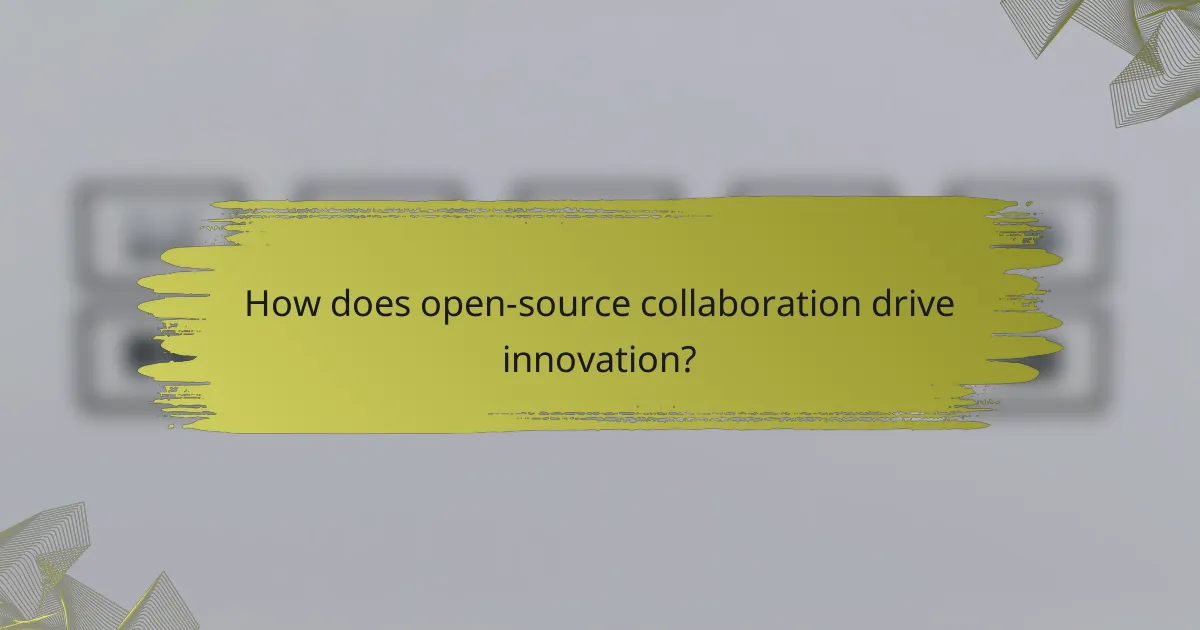
How does open-source collaboration drive innovation?
Open-source collaboration fosters innovation by enabling diverse contributors to share ideas, code, and resources, leading to rapid problem-solving and creative solutions. This collaborative environment allows projects to evolve quickly, benefiting from the collective expertise of a global community.
Case studies of successful projects
Notable open-source projects like Linux and Apache demonstrate the power of collaboration. Linux, an operating system kernel, has grown through contributions from thousands of developers, resulting in widespread adoption across various industries. Similarly, the Apache HTTP Server has become the backbone of the web, showcasing how community input can drive significant advancements.
Another example is the Mozilla Firefox browser, which has thrived on community feedback and contributions, continually enhancing user experience and security features. These case studies highlight how open-source collaboration can lead to robust, innovative products that meet user needs effectively.
Impact on product development
Open-source collaboration accelerates product development by allowing teams to leverage existing code and tools. This reduces redundancy and enables developers to focus on unique features rather than reinventing the wheel. Companies can integrate open-source components, which often leads to faster deployment and lower costs.
Additionally, open-source projects benefit from continuous testing and improvement through community contributions. This iterative process helps identify bugs and enhance functionality, resulting in higher-quality products that are more responsive to user demands.
Community-driven enhancements
Community-driven enhancements are a hallmark of open-source collaboration, as users often contribute improvements based on their experiences. This grassroots involvement can lead to innovative features that may not have been considered by the original developers. For instance, user-generated plugins and extensions can significantly expand the capabilities of a software project.
Moreover, communities often organize events like hackathons or sprints, where contributors can collaborate intensively on specific enhancements. These gatherings not only foster innovation but also strengthen community bonds, ensuring ongoing support and development for the project.
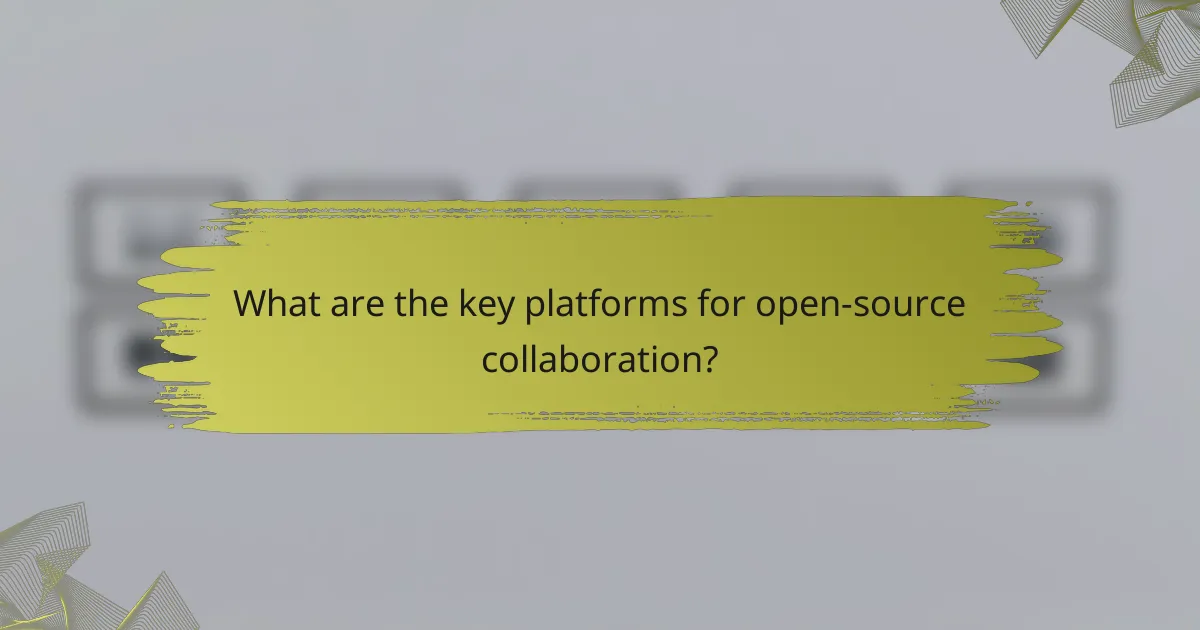
What are the key platforms for open-source collaboration?
The key platforms for open-source collaboration include GitHub, GitLab, and SourceForge. Each platform offers unique features that cater to different aspects of project management, version control, and community engagement.
GitHub as a primary tool
GitHub is the most widely used platform for open-source collaboration, known for its user-friendly interface and extensive community. It allows developers to host repositories, track changes, and manage contributions through pull requests.
When using GitHub, consider leveraging features like Issues for bug tracking and Projects for organizing tasks. A common pitfall is neglecting to document your project properly, which can hinder collaboration.
GitLab for integrated CI/CD
GitLab stands out for its built-in Continuous Integration and Continuous Deployment (CI/CD) capabilities, making it ideal for teams looking to automate their development workflows. This platform allows for seamless integration of testing and deployment processes directly within the repository.
Utilizing GitLab’s CI/CD features can significantly reduce deployment times, often to just a few minutes. However, be mindful of the learning curve associated with setting up pipelines, as it can be complex for beginners.
SourceForge for project hosting
SourceForge is a long-established platform that focuses on project hosting and distribution. It provides tools for managing downloads, documentation, and user feedback, making it suitable for projects that require a more traditional approach to open-source collaboration.
While SourceForge offers a solid platform for hosting, it may not have the same level of community engagement as GitHub or GitLab. Consider using SourceForge if your project requires extensive file hosting and version control without the need for integrated CI/CD features.
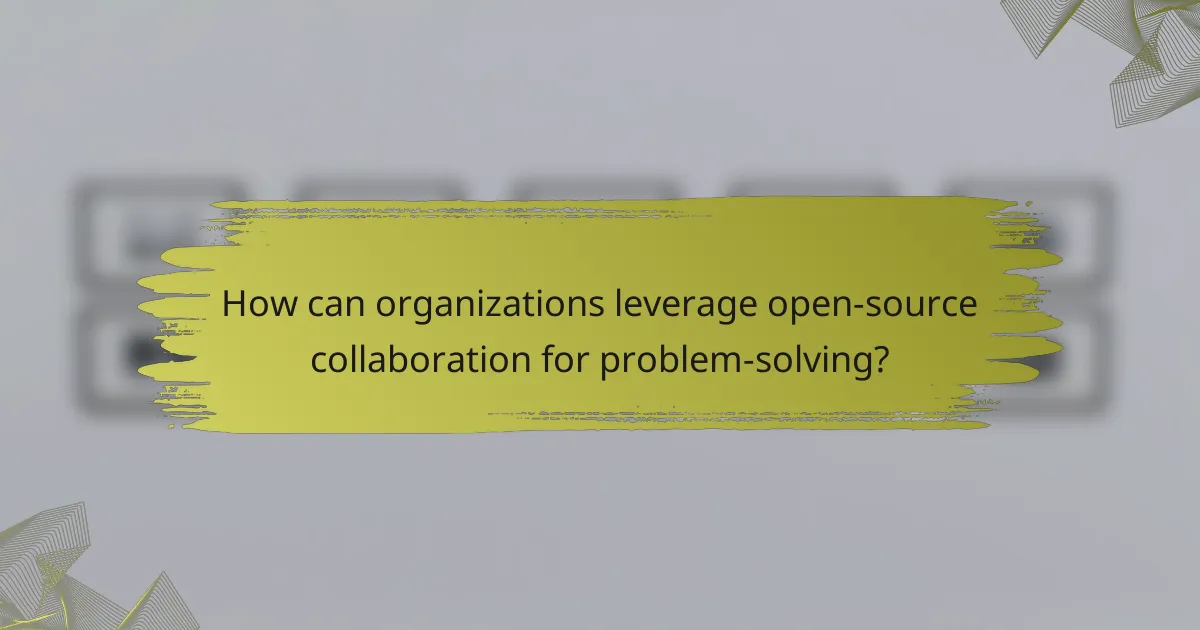
How can organizations leverage open-source collaboration for problem-solving?
Organizations can effectively use open-source collaboration to tackle complex problems by harnessing the collective expertise of a diverse community. This approach allows for innovative solutions and rapid troubleshooting through shared knowledge and resources.
Collaborative troubleshooting methods
Collaborative troubleshooting in open-source environments often involves using version control systems like Git, which enable multiple contributors to work on code simultaneously. This method allows teams to identify issues quickly and implement fixes in real-time, leveraging the strengths of various contributors.
Additionally, employing issue tracking tools such as JIRA or GitHub Issues can streamline the process of reporting and resolving bugs. These platforms facilitate clear communication and ensure that all team members are aware of ongoing challenges and their respective solutions.
Community forums for support
Community forums play a crucial role in open-source collaboration by providing a platform for users to seek help and share solutions. Websites like Stack Overflow and specific project forums allow individuals to post questions and receive answers from experienced developers and users.
These forums often feature a wealth of documentation and user-generated content that can guide problem-solving efforts. Engaging with the community not only fosters collaboration but also builds a sense of belonging and shared purpose among contributors.
Real-world examples of problem resolution
One notable example of effective problem resolution through open-source collaboration is the Apache HTTP Server project, which has continuously improved its software by integrating feedback and solutions from its user community. This collaborative approach has led to enhanced security features and performance optimizations.
Another example is the Linux operating system, where community-driven bug fixes and feature enhancements are regularly contributed by developers worldwide. This collective effort has resulted in a robust, reliable platform that addresses a wide range of user needs and technical challenges.
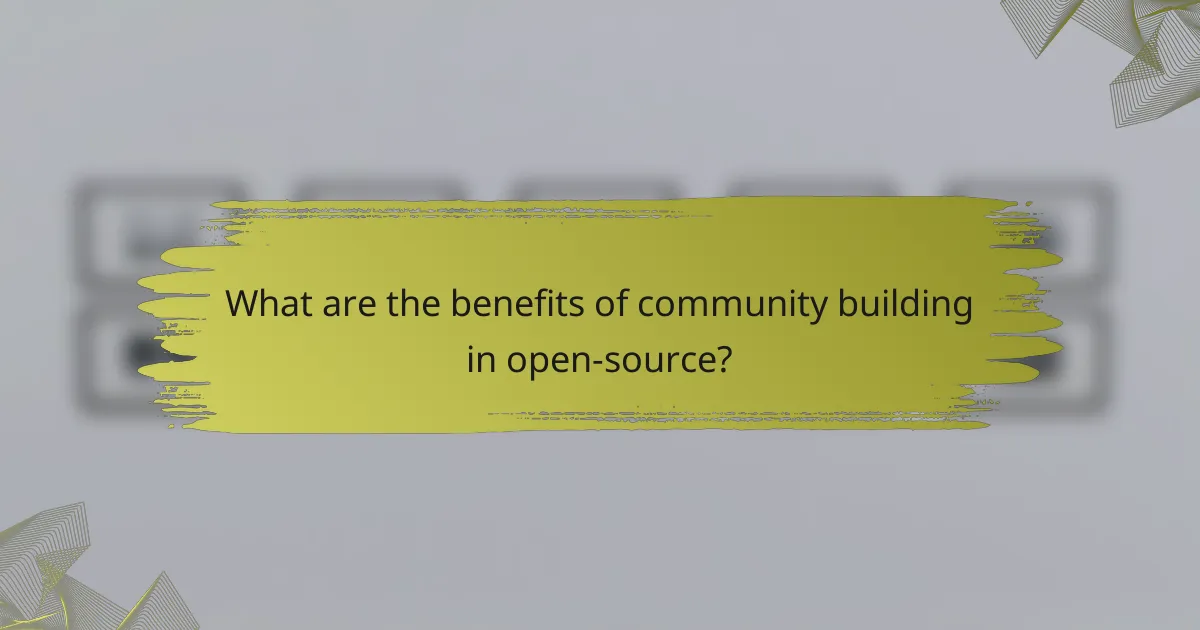
What are the benefits of community building in open-source?
Community building in open-source fosters collaboration, enhances innovation, and strengthens problem-solving capabilities. It creates an environment where developers can share ideas, resources, and support, leading to more robust projects and a sense of belonging.
Increased engagement and contribution
Building a strong community encourages more developers to engage with projects, leading to higher contributions. When individuals feel connected to a group, they are more likely to contribute code, documentation, and support, which can significantly enhance project quality and sustainability.
To maximize engagement, project leaders should create welcoming environments, recognize contributions, and facilitate communication through forums, chat platforms, or regular meetups. This approach can lead to a vibrant ecosystem where contributions flow freely.
Networking opportunities for developers
A thriving open-source community provides invaluable networking opportunities for developers. By participating in discussions, events, and collaborative projects, developers can connect with peers, mentors, and industry leaders, which can lead to job opportunities and partnerships.
Developers should actively participate in community events, such as hackathons or conferences, to expand their professional network. Engaging on platforms like GitHub or GitLab can also help build relationships that may lead to future collaborations.
Shared knowledge and resources
Community building facilitates the sharing of knowledge and resources among developers. Members can exchange best practices, tools, and insights, which can accelerate learning and improve project outcomes.
To leverage this shared knowledge, communities should establish documentation practices and create repositories for resources. Regular workshops or webinars can also be effective in disseminating information and fostering a culture of continuous learning.
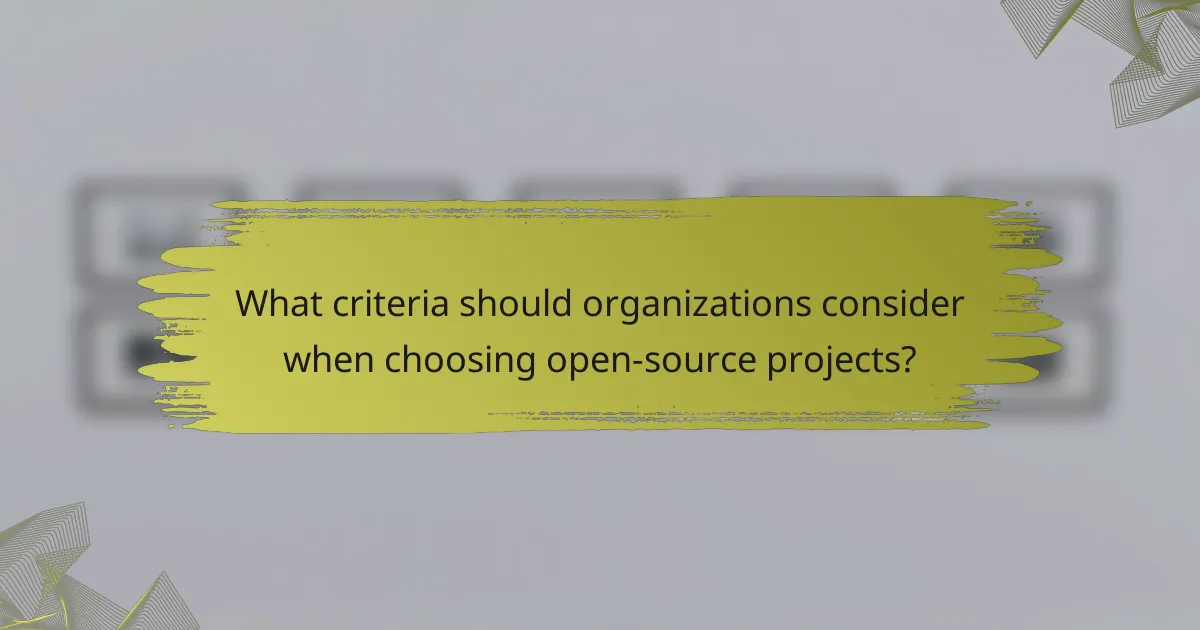
What criteria should organizations consider when choosing open-source projects?
Organizations should evaluate several key criteria when selecting open-source projects, including project activity, maintenance, licensing, and compliance factors. These elements ensure that the project aligns with organizational goals and can be effectively integrated into existing systems.
Project activity and maintenance
Assessing project activity and maintenance is crucial for ensuring long-term viability. Look for projects with regular updates, active contributions, and a responsive community. A project that has frequent commits and a healthy number of contributors is more likely to receive ongoing support and improvements.
Consider the project’s issue tracker and how quickly issues are resolved. A project that addresses bugs and feature requests promptly indicates a committed development team. Additionally, check for documentation quality, as well-maintained documentation can significantly ease integration and usage.
Licensing and compliance factors
Licensing is a critical aspect of open-source projects that organizations must carefully consider. Ensure the license aligns with your organization’s policies and allows for the intended use, whether it’s modification, redistribution, or commercial use. Common licenses include MIT, Apache 2.0, and GPL, each with different implications for compliance.
Organizations should also be aware of any compliance requirements related to data protection and intellectual property. Familiarize yourself with the licensing terms to avoid potential legal issues. Conducting a compliance audit can help identify any risks associated with using a particular open-source project.
